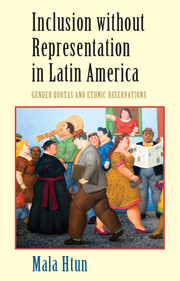Book contents
- Frontmatter
- Dedication
- Contents
- List of Tables and Figures
- Preface and Acknowledgments
- List of Acronyms
- 1 Introduction: Politics of Inclusion in Latin America
- 2 Women, Afrodescendants, and Indigenous Peoples in Elected Office
- 3 Gender Quotas: Why and How?
- 4 Indigenous Reservations and Gender Parity in Bolivia (written with Juan Pablo Ossa)
- 5 Political Inclusion in Colombia
- 6 Brazil: Combatting Exclusion through Quotas in Higher Education
- 7 After Quotas: Women's Presence and Legislative Behavior in Argentina (written with Marina Lacalle and Juan Pablo Micozzi)
- 8 Conclusion
- Appendix 1 Research Trips
- Appendix 2 Mechanisms of Inclusion
- References
- Index
4 - Indigenous Reservations and Gender Parity in Bolivia (written with Juan Pablo Ossa)
Published online by Cambridge University Press: 18 December 2015
- Frontmatter
- Dedication
- Contents
- List of Tables and Figures
- Preface and Acknowledgments
- List of Acronyms
- 1 Introduction: Politics of Inclusion in Latin America
- 2 Women, Afrodescendants, and Indigenous Peoples in Elected Office
- 3 Gender Quotas: Why and How?
- 4 Indigenous Reservations and Gender Parity in Bolivia (written with Juan Pablo Ossa)
- 5 Political Inclusion in Colombia
- 6 Brazil: Combatting Exclusion through Quotas in Higher Education
- 7 After Quotas: Women's Presence and Legislative Behavior in Argentina (written with Marina Lacalle and Juan Pablo Micozzi)
- 8 Conclusion
- Appendix 1 Research Trips
- Appendix 2 Mechanisms of Inclusion
- References
- Index
Summary
This chapter explores how intersectional differences and institutions helped structure the terms of inclusion by focusing on Bolivia, which applies both a gender parity law and reserved seats by ethnicity. The country's experience is puzzling. As is well known, the first (self-identified) indigenous president was elected in 2005 and reelected in 2009. Evo Morales and his party, the Movimiento al Socialismo (MAS, Movement toward Socialism), have defended indigenous interests. After assuming office, Morales appointed people of indigenous descent to cabinet positions and required state officials to speak one of three indigenous languages (Aymara, Quechua, or Guaraní) (Albró, 2006, p. 210). He presided over a constitutional convention and adoption of a new constitution that upholds numerous indigenous rights, including collective land rights, political and legal autonomy, and control over natural resources (República de Bolívia, 2009, Article 30). The national development plan promotes universal health care and income supports while showcasing indigenous cosmovision – including the Andean principle of “living well” – as the paradigm for state policy (Johnson, 2010, p. 143).
Yet the MAS rejected a central demand of indigenous movements. They had requested thirty-six reserved seats in parliament: one for each pueblo (or people) recognized by the constitution. In the end, the electoral law approved by the MAS-dominated legislature guaranteed a mere seven seats to indigenous groups, one-fifth of the number originally proposed and a mere 5 percent of the total seats in the lower house of Congress.
When it came to women, the opposite occurred. In spite of its machista tendencies, the MAS adopted and applied a parity rule leading to the political inclusion of record numbers of women. Then, the Congress approved laws to establish parity between men and women in the national electoral court, the state electoral courts, the Constitutional Court, and in the selection of leaders in autonomous indigenous regions. Though not all of the party caucus agreed, and women deputies had to struggle against recalcitrant male legislators to get the rules adopted, the remarkable parity provisions were adopted without roadblocks, strikes, or intimidation.
Bolivia's indigenous-led government guaranteed indigenous peoples a mere 5 percent of parliamentary seats while women got a gender parity law granting them 50 percent of positions on candidate lists. Why was Evo Morales's government stingy in its response to the demands of indigenous movements for greater political inclusion?
- Type
- Chapter
- Information
- Inclusion without Representation in Latin AmericaGender Quotas and Ethnic Reservations, pp. 70 - 92Publisher: Cambridge University PressPrint publication year: 2016
- 2
- Cited by



